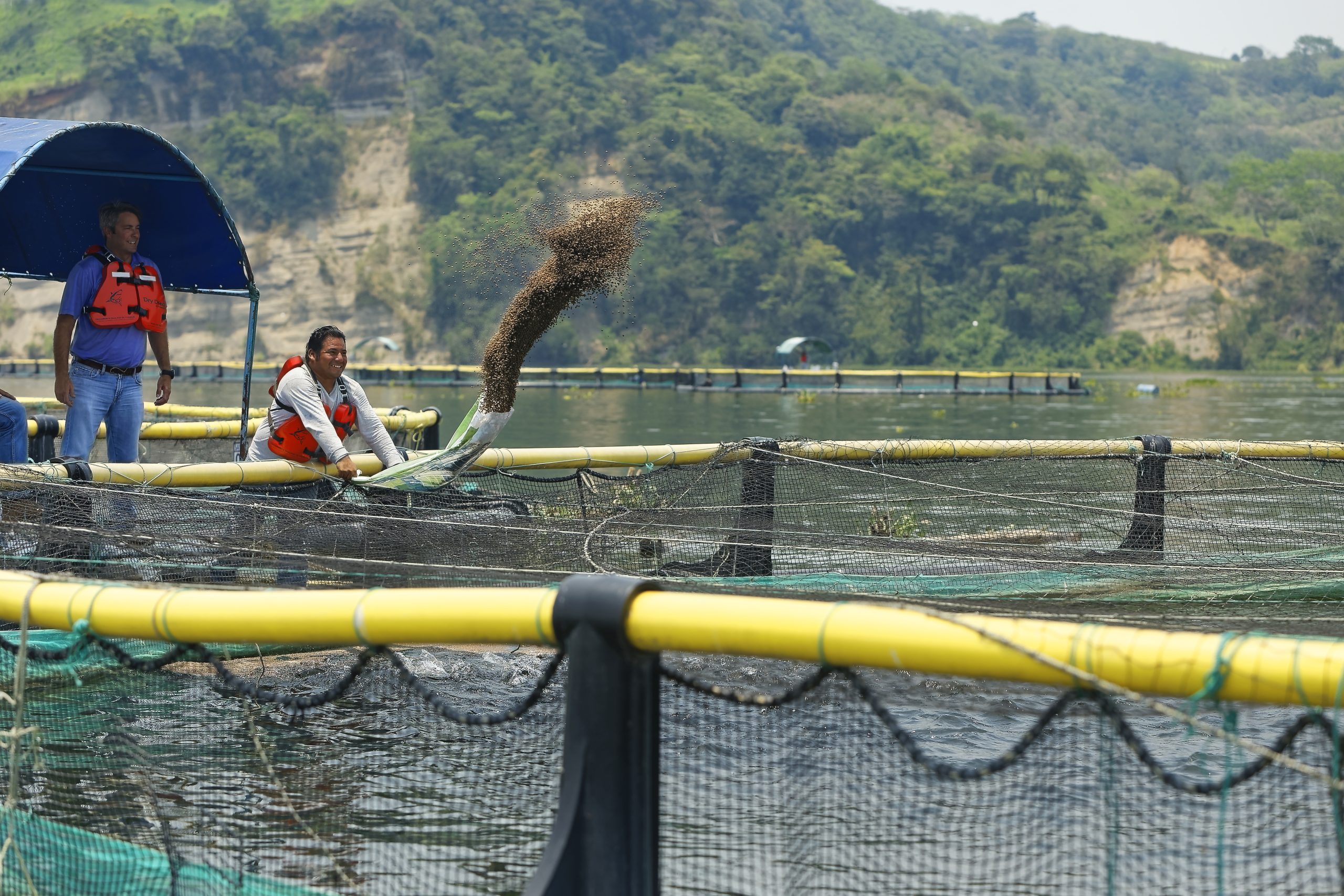
Feed the world: can sustainably farmed fish meet growing demand?
Food insecurity remains one of the most significant global emergencies we face.
According to the UN, over 30% of the world’s population was considered moderately or severely food insecure in 2020. And with the world’s population expected to grow to 9.7 billion by 2050, there’s never been a greater need to increase the availability of nutritious, affordable food sources.
Fish will be crucial to meeting this growing demand, offering accessible sources of protein, omega-3s and vitamin D. Still, as the environment strains under the pressures of climate change, there’s a vital question seafood producers and consumers must ask: is fishing sustainable?
The short answer is yes — but only with the proper controls in place…
Protecting marine ecosystems
Fishing has long provided essential nourishment and employment for people across countries and cultures, with the oceans’ fish stocks offering an accessible, low-cost food source for many vulnerable communities.
Wild fish is high in nutritional value and low carbon, with a study of greenhouse gas emissions finding that a kilogram of wild-caught fish produces between one and five kilograms of carbon compared to 50 to 750 kilograms per kilogram of land-farmed red meat.
However, wild fish farming is a significant contributor to marine pollution. For example, a 2021 study by Nature found that bottom trawling (dragging weighted nets across the seabed) can release as much carbon dioxide as the entire aviation industry every year.
Collecting, storing and transporting fish from oceans to customers can also incur hefty carbon footprints. Plus, illegal, unregulated and unreported fishing is a growing concern, threatening the sustainability of ocean fish populations and damaging marine ecosystems.
Government initiatives like the UK’s Fisheries and Seafood Scheme and regulations like the Marine Stewardship Council’s (MSC’s) Fisheries Standards aim to make wild-caught fish more sustainable by enforcing best practices for responsible fishing.
But in the meantime, seafood producers need a long-term solution that can deliver a dependable food supply without damaging natural marine habitats and endangering fish species.
This solution? Fish farming.
Championing sustainable aquaculture
Many believe wild fish are healthier and more eco-friendly than farmed fish. On the contrary, responsibly farmed fish is a far greener option — and here’s why…
Also known as aquaculture, fish farming involves cultivating and harvesting aquatic organisms in controlled environments. By raising fish this way, producers can reduce overfishing and help preserve the oceans, lakes and rivers where popular fish are captured in the wild.
Aquaculture can also help protect endangered marine ecosystems, preventing damage to corals and sponges during bottom trawling and minimising ‘bycatch’: the unwanted fish and marine collateral caught in fishing nets.
What’s more, aquaculture centres can grow, capture, clean and package fish in one place — leading to a much smaller overall carbon footprint than wild-caught fish production.
As a result, aquaculture pioneers are championing sustainable fish farming to help add precious protein to global food supplies without depleting natural resources — and fish species such as tilapia that are highly suitable for affordable aquaculture are rapidly gaining popularity.
Tilapia fish can thrive on a vegetable-based diet and require little energy to grow, making them an excellent source of protein. Plus, they have strong immune systems and are amongst the fastest growing farmed fish in the world, meaning they can consistently fill the quota for seafood that meets every expectation for taste, texture and versatility.
Thanks to rising awareness of the health benefits and eco-friendly credentials of tilapia and other farmed ‘blue foods’, aquaculture now accounts for almost half of the world’s supply of fish, crustaceans and molluscs.
But with fish farmers ramping up production to meet growing demand, how can food retailers and consumers determine that a product is from a responsible source?
Finding responsibly farmed fish
Although reputable aquaculture producers dispel the myth that all farmed fish are low-grade and disrupt marine ecosystems with harmful chemicals, some unethical, poor-quality products remain on the market.
Fortunately, responsible seafood companies are making it easier than ever to select the most sustainable, healthy fish products available…
Certification
Look for the MSC’s label on products to ensure they come from a fishery independently certified to the MSC’s standard for a well-managed and sustainable fishery.
The MSC label might also appear alongside the Aquaculture Stewardship Council’s (ASC’s) label, demonstrating that the product in question comes from a producer that limits its environmental and community impacts.
You may also see the Best Aquaculture Practices (BAP) label on some of the most ethical farm-raised seafood products, signifying that the supplier has been certified across every step of the production chain.
Cost
Does the price of a particular fish product seem too good to be true? Chances are, it probably is…
Fish is an affordable protein alternative to land-farmed meat, but an extremely low price likely indicates a sacrifice in quality and sustainability somewhere along the supply chain. So, be sceptical of crazy deals and always prioritise quality over quantity.
Traceability
Consumers are increasingly interested to know where their seafood comes from, so accurately tracking its journey from water to plate is essential.
The presence of an MSC label should indicate that a product has been deemed traceable. Still, all food retailers and customers should expect complete transparency from seafood producers about their farming and harvesting methods to ensure they meet safety and sustainability legislation.
Most importantly, if a supplier can’t demonstrate what it’s doing to reduce its environmental impact and improve animal welfare across its operations, purchase seafood products from one that can.
By doing so, you can help drive forward the sustainable ‘blue food movement’ and ensure only the best and most responsibly sourced fish land on shelves.
As the #1 producer of premium, sustainably farmed tilapia, Regal Springs is dedicated to maintaining the highest ethical standards. For more information about Regal Springs UK and where to buy tilapia fish as a trade customer or consumer, contact our team at eusales@regalsprings.com.


